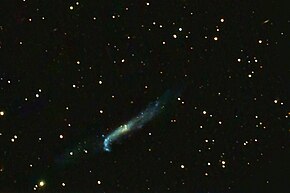Type a search term to find related articles by LIMS subject matter experts gathered from the most trusted and dynamic collaboration tools in the laboratory informatics industry.
| NGC 4656/7 | |
|---|---|
 NGC 4656/7. Credit: Scott Anttila. | |
| Observation data (J2000 epoch) | |
| Constellation | Canes Venatici[1] |
| Right ascension | 12h 43m 57.7s[2] |
| Declination | +32° 10′ 05″[2] |
| Redshift | 646 km/s[2] |
| Apparent magnitude (V) | 11.0[2] |
| Characteristics | |
| Type | SB(s)m pec[2] |
| Size | 78,500 ly |
| Apparent size (V) | 12.9′[2] |
| Notable features | similar to SMC |
| Other designations | |
| UGC 7907,[2] PGC 42863,[2] Hockey Stick Galaxies, Crowbar Galaxy | |
NGC 4656/57 is a highly warped edge-on[3] barred spiral galaxy located in the local universe 30 million light years away from Earth in the constellation Canes Venatici.[4] This galaxy is sometimes called the Hockey Stick Galaxy or the Crowbar Galaxy. Its unusual shape is thought to be due to an interaction between NGC 4656, NGC 4631, and NGC 4627.[5] The galaxy is a member of the NGC 4631 Group.
A luminous blue variable in "super-outburst" was discovered in NGC 4656/57 on March 21, 2005.[6]
